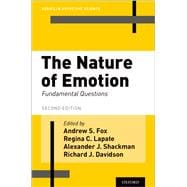Building on the legacy of the groundbreaking first edition, the Editors of this unique volume have selected more than 100 leading emotion researchers from around the world and asked them to address 14 fundamental questions about the nature and origins of emotion.
For example: What is an emotion? How are emotions organized in the brain? How do emotion and cognition interact? How are emotions embodied in the social world? How and why are emotions communicated? How are emotions physically embodied? What develops in emotional development?
At the end of each chapter, the Editors--Andrew Fox, Regina Lapate, Alexander Shackman, and Richard Davidson--highlight key areas of agreement and disagreement.
In the final chapter--The Nature of Emotion: A Research Agenda for the 21st Century--the Editors outline their own perspective on the most important challenges facing the field today and the most fruitful avenues for future research.
Not a textbook offering a single viewpoint, The Nature of Emotion reveals the central issues in emotion research and theory in the words of many of the leading scientists working in the field today, from senior researchers to rising stars, providing a unique and highly accessible guide for students, researchers, and clinicians.








